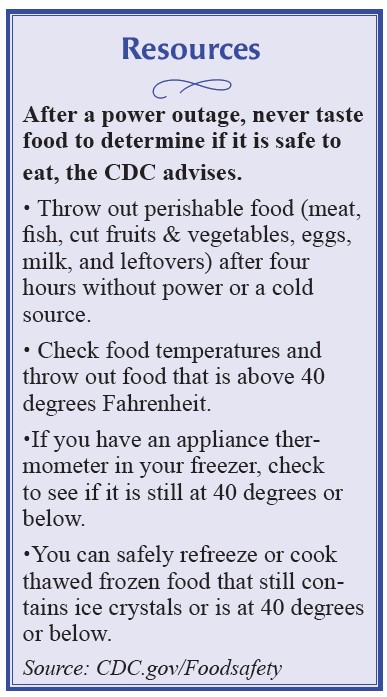This winter is shaping up to be cold and snowy, according to forecasters, who predict El Nino will send more snow to the region than usual. With winds, ice, snow, and even freezing rain a threat to power lines, now is the time to stock up on what you’ll need should the power go out.
In a recent presentation at the Dartmouth Center for Active Living, Registered Dietitian Stephanie Boulay broke down the dos and don’ts of food safety ahead of the coming winter and offered some general tips for staying safe.
“We’ve seen so much crazy weather so it’s always good to be prepared,” she told older adults present.
Food will stay safe in the refrigerator or freezer for a specific amount of time, longer with some tricks or if the doors are not opened, Boulay said. For unopened refrigerators, that time is four hours. For freezers kept closed, it’s 48 hours if the freezer is full or 24 hours if it is only half full.
“So try not to touch what’s in there for as long as you possibly can,” she said.
Keeping your freezer full in advance of a storm will keep food cold longer but, Boulay warned, don’t block the air vents as air circulation is still needed to keep food safe.
Although the temptation to keep food cold by leaving it out in the snow is understandable, Boulay considers it too risky to make any good food safety practices list for one main reason. Snow melts, she said, meaning it may not keep food at safe temperatures.
Put fruits or other perishable foods in the freezer for longer shelf life while power is out and group foods together in the refrigerator to keep them stay cold longer.
Boulay recommends putting a thermometer in the refrigerator and freezer to track the temperature. Bacteria can live in environments that are above 40 degrees or below 135 degrees, she said, making the extremes of hot or cold the best temperature for pro-longed food safety measures.
With or without power, if flooding has occurred and touched food, it must be thrown out because of the bacteria in flood waters, she said.
In advance of a storm, Boulay said accepted practice is to have at least three days of food and water available per person and per pet. Water needs are recommended to be a gallon of water per person (or pet) per day.
One tip, Boulay suggested, is to purchase plastic gallon water jugs that can be save refilled with water in advance of a storm. As long as they are stored safely, they will be good for an extended period of time, she said.
“It’s usually good for a couple of years, especially if it’s in a cool dry place,” she said.
Other items, Boulay suggested be available in case of power outages include paper plates and cups for easy clean-up when the dishwasher cannot be run; extra ice to help keep freezer temperatures down; and extra prescriptions in case travel or other concerns prevent getting the refills needed.


Recent Comments